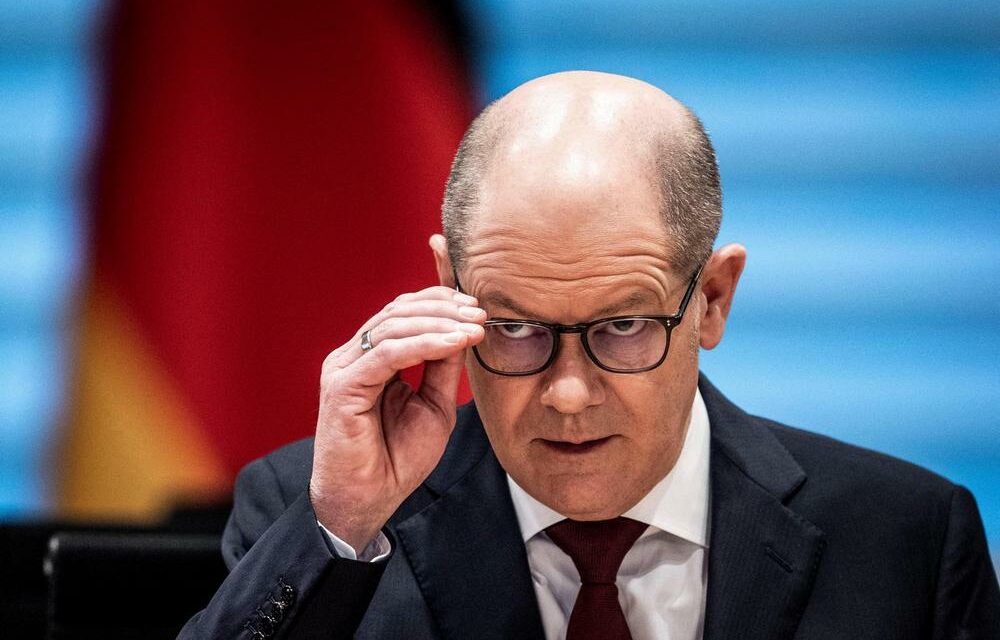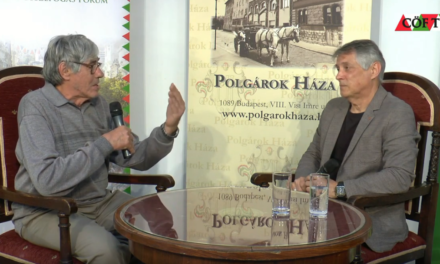German Chancellor Olaf Scholz's spectacular insecurity is slowly leading Germany into economic decline, and this would have bitter consequences for the Union and our country as well. Germany is the biggest economic power in Europe. So it is not important at all to know who leads this country, on which we Hungarians depend in many respects, since the GDP produced by German multi-companies in Hungary plays an extremely important role in the economic performance of our country. But what motivates Olaf Scholz and who is behind it?
Since the end of 2021, the 64-year-old social democratic politician has led Germany in the so-called traffic light coalition, together with the liberal (yellow) FDP and the Greens. Scholz has worked his way up the ladder of his political career with the Social Democrats, from 2009 to 2019 he was the vice president of the SPD, and from 2011 to 2018 he was the mayor of Hamburg. After that, in the joint grand coalition with the CDU-CSU, he was vice-chancellor and finance minister between 2018 and 2021, alongside Chancellor Angela Merkel. He became the chancellor candidate of the Social Democrats last year, and after the CDU-CSU failed miserably in the elections last September and his party won, he has been at the head of the most powerful country in the European Union since last December.
It is a general phenomenon that we do not know the information about the politicians who lead Europe and the Union, which most determine their motivations, interests, and scope for maneuver. (For example, it is almost never mentioned about Macron that he started his career in the Rothschild banking house.) That is why it is important to shed light on who Olaf Scholz is, who he really represents and, based on this, what we can expect from him in an era of crisis, which may be the last Europe experienced the Second World War.
Let's perhaps start with what I already mentioned in the case of Ursula von der Leyen in my previous article. And this is the fact that Olaf Scholz, as well as Ursula von der Leyen, Jens Spahn from the CDU, or previously the legendary Wolfgang Schäuble, participated in the meetings of the Bilderberg group. True, he did not four times, like Von der Leyen, only once, in 2010. This annual regular and secret Bilderberg meeting was held in Sitges, Spain, which was attended by Scholz, among others Josef Ackermann, the former president of Deutsche Bank, Dieter Zetsche, the head of Daimler, Robert Zoellick, the president of the World Bank.
We know very well that an invitation from the Bilderberg group is usually the beginning of a wonderful friendship with the global elite in most cases...
From 2011, Scholz was the mayor of Hamburg, during this period the so-called Cum-Ex scandal erupted, during which the tax frauds of giant companies were revealed, including that of Warburg Bankháza, to which Scholz had special ties. It is also a fact that although Scholz condemned tax evasion to a large extent, according to the bad language, perhaps his contribution could have contributed to the fact that the case was covered up, and there were no consequences.
The other case erupted during his tenure as finance minister: Wirecard AG announced its insolvency in 2020, and it turned out that around 1.9 billion euros had disappeared from the giant company. Scholz, as Minister of Finance, publicly promised everything that they would investigate the case. However, his activities were not convincing, the incriminating files only came out belatedly, and several people raised his personal involvement.
His successful activities do not include the fact that during the three days of the G20 meeting held in Hamburg in 2017, large-scale and vehement demonstrations took place in the city, especially by far-left forces, the "result" of which was 476 injured officials and 12 million euros in damage. vandalism in the city, setting cars on fire, etc. However, Scholz's chair was not shaken by this unsuccessful event.
But let's move on to the more important question: who does Scholz represent? As a social democratic politician, we would think the interests of the workers, the bottom, and certainly not those of multi-companies and global financial institutions. Well, we are wrong about this.
Scholz, a few days (!) after becoming Minister of Finance, appointed Jörg Kukies, the head of the American global bank Goldman Sachs in Germany, as his Secretary of State. Financial expert Ernst Wolff said at the time that this was a clear and unequivocal sign that Scholz, as a Social Democrat (!) Minister of Finance, was putting the ministry's affairs under the interests of Wall Street...
Of course, there were precedents for this: even when he was mayor of Hamburg, the financial institution called HSH Nordbank collapsed, and as a result of Scholz's effective contribution, the profitable, i.e. still usable, part of the bank was transferred to a Wall Street hedge fund (money management fund), while - how interesting - the unusable parts of the bankrupt bank, together with the debts, returned to the German state, whose juice was finally drunk by the tax-paying citizens. In other words, Scholz's attraction to global money capital did not begin as Minister of Finance, but much earlier, surely to the greatest delight of the workers...
His relationship with the global elite is also clearly shown by the fact that several meetings took place between him, Jörg Kukies, and the former CDU faction leader, Friedrich Merz, who is now the president of the CDU, during his tenure as Minister of Finance. I myself did not know that Merz was thoroughly integrated into the global financial elite, which is not proven better than what organizations he is a member of. These are (among others): the Atlantikbrücke (Atlantic Bridge), of which he was the leader for several years. This organization is the representative of American lobbying interests in Germany.
The next one is BlackRock, now the world's largest (!) multinational asset management company, behind which lie the largest banking dynasties; Merz was the chairman of the supervisory board here. And last but not least, today's CDU chief is also a member of the Trilateral Committee founded by the Rockefeller family, which includes important world leaders.
I think there are two lessons to be learned from the above. One is that, after the personal and financial entanglements, what difference remains between a Social Democrat and a CDU or CSU politician or, as the case may be, leading politicians? Of course, there are and can be nuanced differences between German and German politicians, for example, in which one more fiercely represents the interests of the globalists.
It is clear that the co-chairman of the Greens (Grünen), Robert Habeck, who is currently Vice-Chancellor and Minister of Economic and Environmental Protection, particularly hates the German identity, so he is not only financially connected to global circles, but also emotionally. In one of his writings, he stated a few years ago that if he was told about German patriotism, he would simply feel nauseous.
Compared to the obviously cosmopolitan vice-chancellor, Scholz is a somewhat more old-fashioned politician who is not yet as globalist as the leaders of the Greens, in his case financial interests are more decisive. For example, compared to Annalena Baerbock, co-chair of the Greens, who is the current foreign minister, she is very non-“progressive” and cosmopolitan. In fact, the latter did nothing less in the name of patriotism than to choose American citizen Jennifer Morgan, the leader of Greenpeace, as his secretary of state in the field of international climate policy matters...
I think that Germany is currently led by politicians who govern the country not in accordance with German national interests, but in accordance with the interests of global money capital. And this is a huge trouble and a blow for Europe. All this is particularly tragic from the point of view of the future of Europe during the Russian-Ukrainian war and the energy crisis.
At the end, I would like to quote a few lines from the writings of a German author. Already in 2020, former Bundestag employee Sebastian Friebel saw the changes in German political life this way: "The financial sector installed its own people in the political forefront - and we watched helplessly. […] This change is far from accidental, but the end result of a decade-long policy that favors the richest 0.01 percent. [...] The world's largest financial concern, BlackRock, meanwhile, officially advises the EU on financial issues. Would the financial industry be able to influence politics even more clearly than this?"
The plan of the World Economic Forum is taking shape: instead of statesmen, technocrats and financiers must manage the "technodemocracy" of the new world.
The author is a political scientist, research consultant of the Center for Fundamental Rights, member of the C12 expert group
Cover image: German Chancellor Olaf Scholz / Photo: Michael Kappeler/dpa-Pool/dpa
Source: Hungarian Nation












